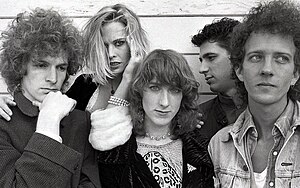Game Theory | |
|---|---|
 Game Theory publicity photo in 1986 (Scott Miller, Donnette Thayer, Shelley LaFreniere, Guillaume Gassuan, Gil Ray) | |
| Background information | |
| Origin | Davis, California, U.S. |
| Genres | Power pop, jangle pop |
| Years active | 1982–1990, 2013, 2016–2017 |
| Labels | Rational, Enigma, Alias, Omnivore |
| Spinoffs | The Loud Family, Hex |
| Spinoff of | Alternate Learning |
| Past members |
|
| Website | www |
Game Theory was an American power pop band, founded in 1982 by singer/songwriter Scott Miller, combining melodic jangle pop with dense experimental production and hyperliterate lyrics. MTV described their sound as "still visceral and vital" in 2013, with records "full of sweetly psychedelic-tinged, appealingly idiosyncratic gems" that continued "influencing a new generation of indie artists."[1] Between 1982 and 1990, Game Theory released five studio albums and two EPs, which had long been out of print until 2014, when Omnivore Recordings began a series of remastered reissues of the entire Game Theory catalog. Miller's posthumously completed Game Theory album, Supercalifragile, was released in August 2017 in a limited first pressing.
Miller was the group's leader and sole constant member, presiding over frequently changing line-ups. During its early years in Davis, California, Game Theory was often associated with the Paisley Underground movement, but remained in northern California, moving to the Bay Area in 1985, while similarly aligned local bands moved to Los Angeles.[2][3]
The group became known for its fusion of catchy musical hooks with musical complexity, as well as for Miller's lyrics that often featured self-described "young-adult-hurt-feeling-athons,"[4] along with literary references (e.g., Real Nighttime's allusions to James Joyce), and pop culture references ranging from Peanuts ("The Red Baron") to Star Trek quotes ("One More for St. Michael").
- ^ Cite error: The named reference
mtvhive2013was invoked but never defined (see the help page). - ^ Cite error: The named reference
burtwas invoked but never defined (see the help page). - ^ Cite error: The named reference
derogatis1996was invoked but never defined (see the help page). - ^ Cite error: The named reference
tinker-linerwas invoked but never defined (see the help page).